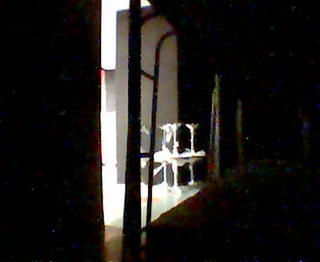My youngest brother had been taking his post-graduate studies finally this year and, I am happy to report, doing well. However, he is suddenly finding that having a job and studying in the evening is taxing and time-consuming. To cut a long story short: even if he has a PC at home and access to a laptop that his job is allowing him to use, he finds that both are still too inconvenient for him. He needs, for instance, access to several Bible versions and a few resources that would have had him lugging around big books, or else, copious notes. There are, of course, eBook versions of these that are normally readable on the PC or a laptop, but as I said these are very inconvenient to bring. The obvious solution is, of course, a PDA.
Since he cannot afford something brand new, he has had to trade in his Nokia and get something second-hand. If I might say so myself, the O2 XDA II PDA we got last Wednesday was a good bargain. It had the original box with complete original accessories with it, including the important installation CD. By the next day, I had already installed a lot of free resources (like several Bible versions, including one in Tagalog, and some other references) and he was able to copy his report (in MS Word Doc format) onto it for him to easily modify later for his class.
It took almost the entire day on Wednesday to find him a good bargain, and I had barely enough time to prepare my sermon. I wasn't in the mood to use the lectionary and I had wanted to give a sermon on "Love" since it was February after all. But I found that having too much to say is as much a disadvantage as having too little. In the end, I merely listed down some facts that I do know about love (including the four divisions that C.S. Lewis made) and several Bible verses about why we should love and what cold love is a symptom of. I used the "Compose" feature of Gmail to write my sermon so that I don't have to open MS Word or WordPerfect. I wrote only an almost bare outline and decided to wing it later than night.
In the end, if the congregation is to be believed, they thought it was the best sermon I have given yet (I've preached a total of two to this particular group of parishoners), and one of the pastors listening even told me that he was touched to the heart. It was a personal success for me, but I must admit that it almost ended in disaster.
If there is one thing that ties in all of these is that, despite having a PDA myself (an aging Palm m130) I am still having difficulty organizing data. Oh, I am very happy with my Palm device for data of a digital matter; but I mostly use it as a portable digital library of eBooks I have either obtained or digitized myself. I rarely use the "To Do" function. About the only other function that I extensively use is the "Calendar" function (as a glorified alarm clock to remind me of important events like birthdays and tv program schedules) and the "Address Book" function (for storing phone numbers and other details). But the one thing that I had hoped I could use it for, that of a personal database, is the one thing that I have not used it for lately.
It's not entirely my fault. I had in previous times used it as such, using Documents To Go as a digital "tickler" notebook. But I have since worn out the touch screen with my incessant note-taking that it is no longer reliable for that purpose. The touch screen works well enough for me to access my eLibrary, but little else.
I can, of course, purchase a folding keyboard, but that kinda defeats the purpose of it being a "portable" digital notebook. In the end, it spends more time sitting pretty in it's neophrene holster as a glorified digital Library and newspaper (using AvantGo, I'd been downloading the Daily Inquirer and other news sites) that I can read in the dark.
But with this on-g0ing online debate, I really need a notebook for taking notes and organizing my thoughts. I had always used tickler notebooks before, but inspite of their working well for its purpose, they aren't versatile enough.
Then, several things happened at once. I remembered that back in college we used notecards instead of notebooks (basically, they are index cards used for the purpose of taking quotations and properly referencing them). Before I started using my wife's m130, I always had a pack of them in my pocket for taking down notes. They were easy to organize, but also easy to lose track of.
Then, while reading about Internet Phenomena on Wikipedia, I came across this article on the Hipster PDA, and it seemed to be the answer I was looking for. I quote the entire article below:
The Hipster PDA is a paper-based personal organizer popularised, if not invented, by San Francisco writer Merlin Mann. Originally a tongue-in-cheek reaction to the increasing expense and complexity of personal digital assistants, the Hipster PDA (said to stand for 'Parietal Disgorgement Aid') simply comprises a sheaf of index cardsThe answer has been obvious all along. In my most recent job, I had used index cards more often than tablets they gave us; I had even written my entire presentation on it. Of course, the term is a misnomer, since PDA stands for Personal Digital Assistant, but this "PDA" is not digital. It's analog. Of course, according to the article above and the site that "instructs" you how to "construct" one (43Folders), it's supposed to mean "Parietal Disgorgement Aid," whatever that means. I guess they need to keep the PDA acronym to preserve its "geek" factor; calling it merely a "sheaf of index cards" isn't cool.
Hipster PDAheld together with a binder clip. Following widespread coverage in the media and blogs, the Hipster PDA (abbreviated 'hPDA') has become a popular personal management tool particularly with geeks and followers of David Allen's Getting Things Done methodology and users of the Fisher Space Pen.
Advocates of the hPDA claim that it is a cheap, lightweight, free-form organiser which doesn't need batteries and is unlikely to be stolen. Critics cite the lack of integration with desktop PC productivity software and point out that there is no easy way to back up the often critical information stored in an hPDA.
Although it began as a joke, or perhaps a statement about technology fetishism, the Hipster PDA has rapidly gained a population of serious users, with hundreds posting pictures of their customised hPDAs on photo sharing sites and exchanging tips on Internet mailing lists. Enthusiasts also design and share index card-size printable templates for storing contacts, to-do lists, calendars, notes, project plans, and so on.
The Hipster PDA (perhaps so named because it is a pocket device, or as an allusion to hipster culture) has become something of an Internet phenomenon, gaining popularity primarily among young, technology-literate people especially IT workers. It represents a 'back-to-basics' or Zen attitude to personal management.
I will be constructing one, because I need it (especially on that online debate on the mailing list), but I will be calling it hPAA, short for Hipster Personal Analogue Assistant. It will be pronounced as hi-pah (with the glottal stop) so that it can benefit from the assonance with iPAQ. In my mind are numerous "hacks" to make my hPAA more "gadget-like" (like constructing a cardboard wallet with pockets for Post-it flags and a pen), but I guess I'll try to keep it simple for now and use a binding clip in the meantime.
I must remind myself that I am construcing a hPAA not to play around with it, but to use it as a tool.
Anyway, I'm intrigued by this and I will give an update as to how it works. I can't wait to make one tomorrow!














 Thanks, Slaxx! Really appreciate it.
Thanks, Slaxx! Really appreciate it.